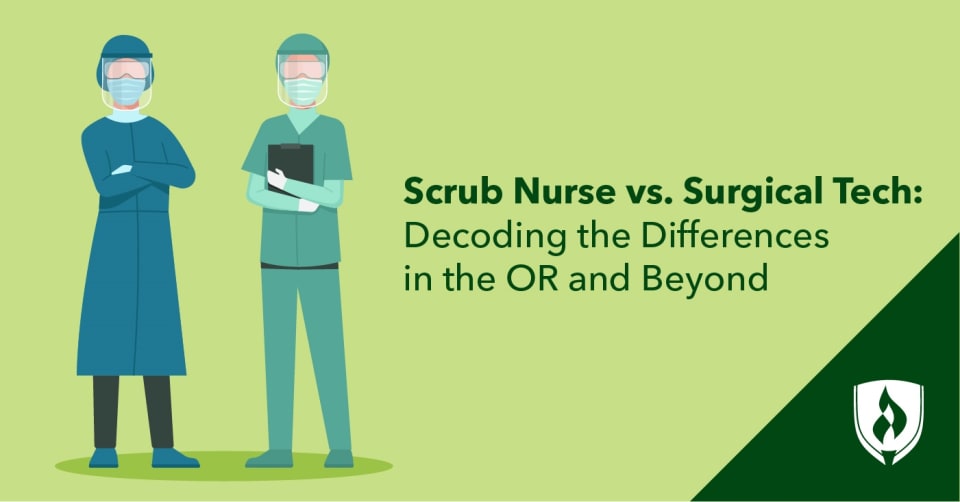Scrub Nurse vs. Surgical Tech: Decoding the Differences in the OR and Beyond
By Brianna Flavin on 09/27/2022

Surgery is a simple word that covers a massive number of procedures, phases, knowledge areas and essential skills. When you think of all the moving parts that have to come together for a safe operation, you might understand why there are so many different healthcare roles related to surgeries.
In each operation, patients need to be prepared, monitored and transported to the operating room. The operating room needs to be prepped with sterile equipment and with machines and supplies in pristine shape. The area of operation on each patient needs to be sanitized and protected, anesthesia administered, vitals monitored, medical history double-checked—and all of this happens before the surgeon makes a single incision.
So who’s helping to do all that? Two roles involved that you may have heard of are that of a scrub nurse and a surgical technologist. If you’re wondering how these two roles compare and where they fit in inside the operating room, you’re in the right place.
Scrub nurse vs. surgical tech: What they do
Let’s start by laying the groundwork for what these roles are responsible for. The term scrub nurse can be a confusing job title because it is a specialized role under the larger umbrella of surgical nursing. Surgical nurses (also called perioperative nurses) have many areas of specialization they can go into—and many different roles they can adopt during an operation. Scrub nurse is one of those roles.
Scrub nurses work inside the sterile field of an operating room. They prepare the room for patients, arrange supplies and hand surgical instruments to the surgeon during procedures when needed. These critical members of the surgical team need an awareness of the steps and instruments involved in each operation to better meet and anticipate the surgeon’s next steps. This includes the ability to react to complications by providing necessary instruments, medications and other critical measures.
Other potential functions of a scrub nurse, such as administering medication or monitoring vitals, will depend on their nursing degree and their state.
Surgical technologists work as a member of the surgical team to keep the operating room safe, with functioning equipment and technologies that assist surgeons with each procedure. They prepare sterile solutions and even medications for the surgery and may transport patients in and out of the OR. Depending on the facility, surgical techs might also assist in the surgery by passing instruments to the surgeon, holding organs in place or transporting samples to lab analysis.
As you can see, there’s some crossover between these two roles. Both take responsibility for the operating room environment and supplies, and both can assist surgeons with instruments during an operation. Some hospitals rely on surgical techs entirely for the scrubbing role, some use scrub nurses, some may have both.
That said, scrub nurses can monitor patient vitals, administer medication, perform injections and other tasks that surgical technologists cannot typically perform. Some states technically allow surgical techs to act as scrub nurses and assist with certain tasks under the direct supervision of a registered nurse (RN), but it is unclear how many healthcare providers take this approach. The scope of practice for each of these roles will mainly come down to each healthcare system in compliance with state regulations.
One other key difference between scrub nurses and surgical techs is that scrub nurses can switch roles and work in other nursing capacities. Scrub nurses with about two years of experience and valid RN licensure (among other requirements) can become RN first assistants (RNFAs) with additional education. RNFAs have a much more hands-on role in surgery, cutting tissue, suturing, handling wounds and caring for patients post-operation.
Without additional education, scrub nurse RNs can also shift into other OR nursing roles, like being the circulating nurse outside the sterile field in operations, or even move away from surgical nursing altogether. Their nursing foundation makes work in many other healthcare institutions and positions possible.
Scrub nurse vs. surgical tech: Education requirements
The education requirements for a scrub nurse vary. Some hospitals allow licensed practical nurses to scrub under the supervision of an RN, but many require scrub nurses to be RNs. That said, earning an Associate’s degree in Nursing or a Bachelor of Science in Nursing on the way to becoming an RN would fulfill the education requirements for nearly any scrub nursing role.
For surgical technologists, the Bureau of Labor Statistics (BLS) reports that most employers expect a diploma, certificate or a Surgical Technologist Associate’s Degree.1 Additionally, surgical technologists may need to seek out professional credentials like the Certified Surgical Technologist (CST®) or the National Center for Competency Testing (NCCT) Tech in Surgery – Certified TS-C. Both will require applicants to pass an examination used for validating their knowledge.
Scrub nurse vs. surgical tech: Important skills
To get a better idea of these two healthcare careers, we analyzed 700 scrub nurse job postings and over 60,000 surgical technologist job postings to see what essential skills employers wanted most.
Important scrub nurse skills:2
- Surgery
- Advanced Cardiac Life Support (ACLS)
- Critical Care Nursing
- Communication skills
- Planning
- Teamwork/Collaboration
Commonly sought-after surgical technologist skills:2
- Patient care
- Aseptic technique
- Sterile procedures
- Knowledge of surgical instruments
- Communication
- Building effective relationships
For both of these careers, it’s critical to understand operations and the moves a surgeon needs to make. While scrubbing looks similar from surgery to surgery, other tasks will vary greatly based on the type of operation. Consider how different eye surgery is from a heart operation, or how different a C-section is from the operation for treating scoliosis.
No matter the role, these professionals need to be able to think on their feet and quickly react in the event of a complication or unexpected issue. Additionally, attention to detail and communication are critical—the stakes for mistakes and miscommunications in these roles can be very high.
Where would you prefer to be?
While scrub nurses and surgical techs may step into some of the same duties, they have very different career paths. If you love the idea of working in the operating room and being part of a surgical team that saves and improves lives, it’s just a matter of choosing which path you want to take.
If you think a scrub nurse career—or any other type of nursing role—sounds like it could be the better fit for you, visit the Rasmussen University School of Nursing page to learn more about your potential education options.
If you think a surgical technologist career is more for you, visit the Rasmussen University Surgical Technologist program page. Looking for more? Our article, “6 Enticing Reasons Why Becoming a Surgical Technologist Is Worth It” can provide some other solid reasons for considering this healthcare career path.
1Bureau of Labor Statistics, U.S. Department of Labor, Occupational Outlook Handbook, [career information accessed August, 2021] www.bls.gov/ooh/. Information represents national, averaged data for the occupations listed and includes workers at all levels of education and experience. Employment conditions in your area may vary.
2Burning-Glass.com (analysis of 700 scrub nurse job postings and 66,766 surgical technologist job postings, Jul. 01, 2020 - Jun. 30, 2021).
Certified Surgical Technologist is a registered trademark of the National Board of Surgical Technology and Surgical Assisting.




